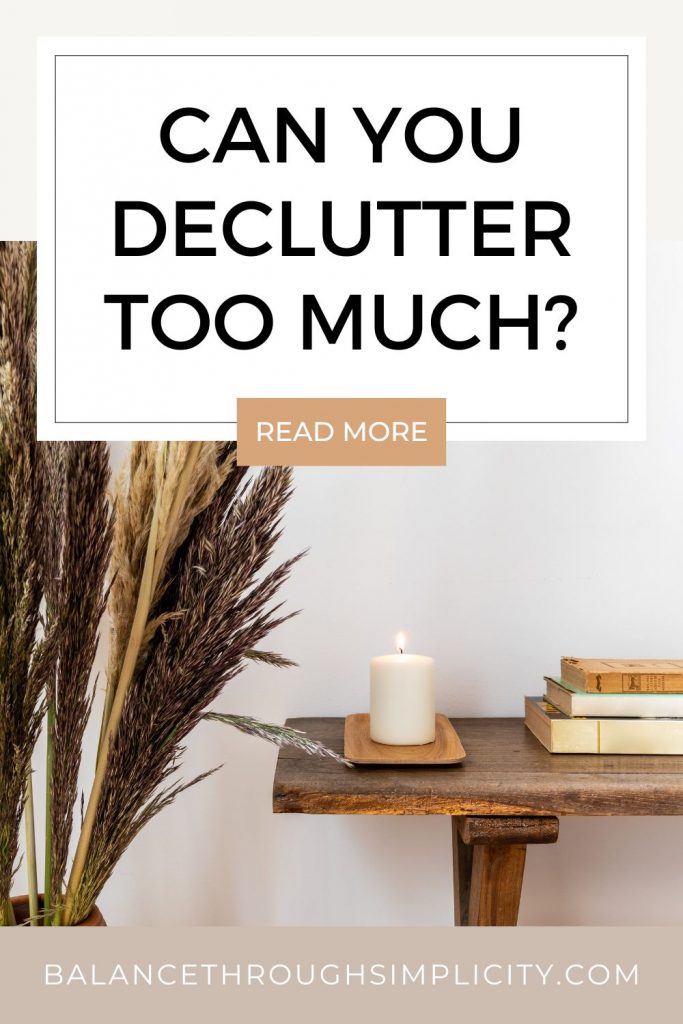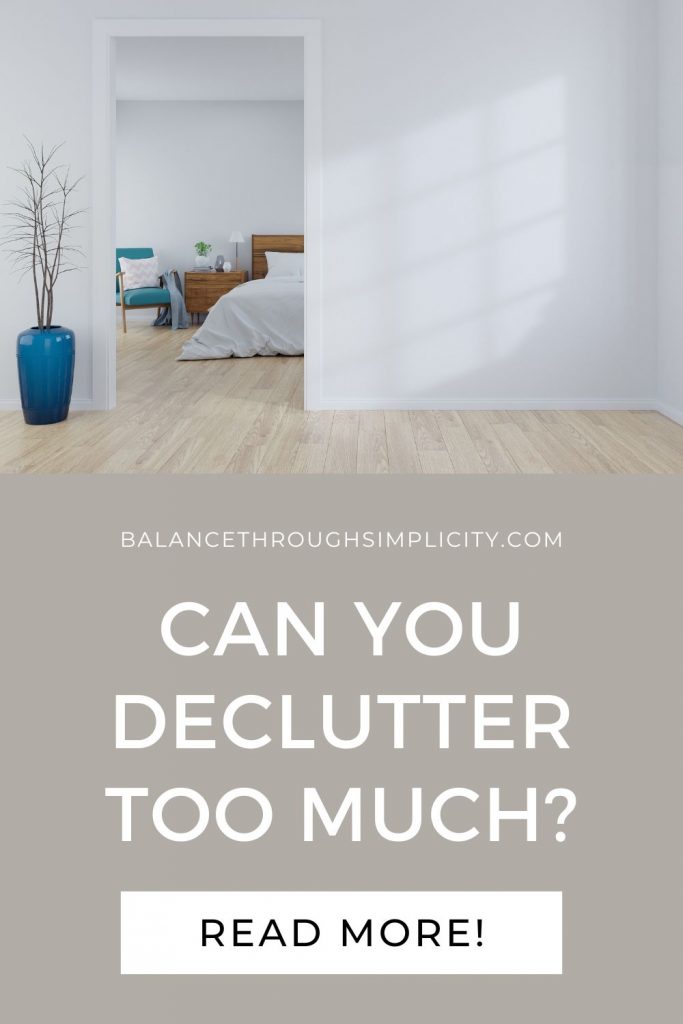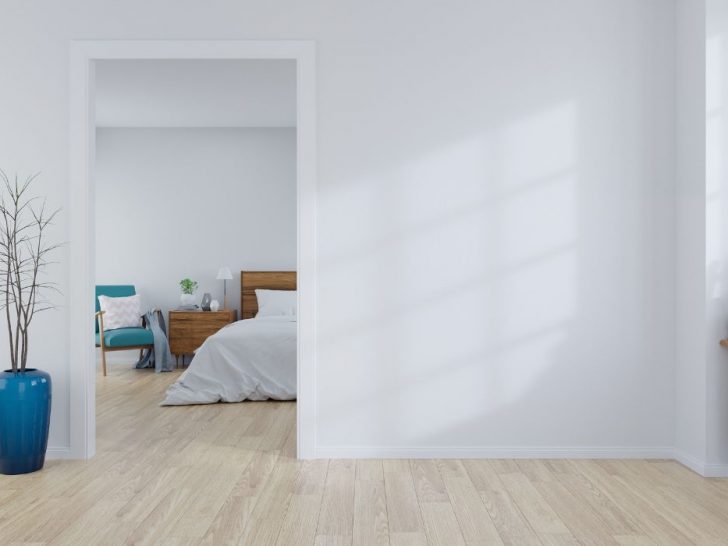CAN YOU DECLUTTER TOO MUCH? WHEN DECLUTTERING GOES TOO FAR
I was researching decluttering on the internet and came across the question of can you declutter too much? I thought it would be helpful to share some thoughts on this in today’s article so you can explore your own relationship with clutter.
THE DEFINITION OF DECLUTTERING
The Collins Dictionary says to declutter is “to simplify or get rid of mess, disorder, complications”.
Decluttering has certainly become a very popular way of reducing stress and creating more ease in a busy, noisy, cluttered modern world.
DECLUTTERING TOO MUCH CAN BE A CONDITION
Whilst doing my research, I came across Wikipedia’s answer to the question on whether you can declutter too much.
Wikipedia states:
“Compulsive decluttering is a pattern of behaviour that is characterised by an excessive desire to discard objects from one’s home and living areas. Another term for this behaviour is obsessive compulsive spartanism. The homes of compulsive declutterers are often empty. It is the opposite of compulsive hoarding.”
Wikipedia goes on to say that “Compulsive decluttering is a type of disorder that is classified within a broad name, obsessive compulsive disorder, or OCD. Compulsive decluttering is the act of throwing items, or clutter, away, or getting rid of them in an attempt to “clean up” what one with the disorder may think is cluttered.”
DECLUTTERING vs THE DAILY INFLUX OF CLUTTER
One of the problems with decluttering is that clutter comes into our homes and lives on a daily basis. There are so many different types of clutter that we can’t help but be affected by them in one way or another.
Even if you don’t hoard stuff or buy anything new, you can still feel negatively affected by clutter – junk mail landing on your doormat or inbox, ads whilst you’re watching TV or even packaging around your food.
Clutter doesn’t stop just because we’ve decided to stop decluttering.
So the problem is that decluttering isn’t a do-it-once project that you can tick off and never have to do again. Getting rid of your stuff and keeping it away requires ongoing maintenance and awareness.
HOW TO DEAL WITH CLUTTER
And therein lies part of the problem. If you have a tendency to perfectionism or for control, for example, then it feels very frustrating to have decluttered your home only for it to become cluttered again.
Simplifying isn’t easy and we put time, effort and energy into decluttering our homes and lives.
How annoying it can be when clutter threatens to invade our space and undo our hard work.
Either:
- We adopt a simple strategy to stay clutter-free with daily habits and routines in place and accept that clutter is a normal part of life, or
- We give in to the clutter and let it mount up to deal with tomorrow or another day, or
There’s a third option for some…
- We declutter too much and fall into the compulsive decluttering category

CAN YOU DECLUTTER TOO MUCH?
I don’t know how many of us would fall into the compulsive decluttering category, but I have wondered myself about whether it’s possible to declutter too much.
There are some wonderful benefits to clearing clutter including giving yourself time, space and freedom to live your life instead of manage your stuff.
However, it might also be that you overthink the clutter in your home. At times like this, decluttering becomes the ‘be all and end all’ when actually it’s just a tool or mechanism to simplify your life.
The ultimate goal is not the decluttering itself, it’s what you’re going to do with your clutter-free life that counts.
Sometimes though, when we’ve invested so much of our resources and motivation into decluttering, we can be extra-vigilant about it coming back in. We guard our homes from the clutter and it’s difficult to stop the decluttering bus when it’s at full speed.
Decluttering can perhaps be a little bit addictive if you enjoy the adrenalin rush of getting rid of things and love the benefits this purging can bring.
SIGNS YOU MIGHT BE DECLUTTERING TOO MUCH
If you think you might be decluttering too much, here are some signs that you could look out for:
- Your home isn’t a fun and happy place that it once used to be
- You worry about making mess so stop doing activities that might create mess
- You don’t let your kids do certain activities because it might bring mess and clutter
- You feel guilty for owning so much
- You can’t relax until you’ve got stuff cleared away or gotten rid of out of the house
- You stop enjoying things you used to enjoy because it might impact on your environment
- You don’t buy things you really need in case they clutter your home
- You spend too much time decluttering
- You feel excess relief when you throw something away
- If you feel stressed or anxious, you feel soothed by decluttering
- You get rid of things that are important for your every day life and needs
- Your mind is preoccupied by thoughts about decluttering
- Your home has very little in it but still feels cluttered
- Friends and family have raised concern about your levels of decluttering
These are just a few signs that you might be decluttering too much. That doesn’t mean that you have Obsessive Compulsive Spartanism. It might just be time to put down your decluttering tools and do something else for a while. Don’t forget, simplifying isn’t just about getting rid of clutter. It’s how you fill that space instead.
WHEN DECLUTTERING STEALS YOUR JOY AND PEACE
Some of these signs I listed above might all be a little extreme but you may notice some more subtle signs that you’re decluttering too much. One of these is when decluttering steals your joy, peace and happiness and you’re thinking less of these and more about your stuff.
Minimalism and a simpler lifestyle is not an exercise in deprivation or scarcity. You don’t need to live with bare white walls, no furniture and never go shopping in order to live a simple life.
Decluttering, instead, is meant to be liberating and empowering and help you restore peace and calm to an otherwise busy home and life.
However, there are times when even I have decided not to go on a fun shopping spree because I’m worried how to deal with the stuff I might end up buying. I’ve dreaded Christmas because of the extra festive clutter getting in my way at home. I wish my husband hadn’t bought me that kitchen appliance because it’s just going to sit on my kitchen counter even though he thought it would make my life easier. Or, I didn’t want to cook with my kids because of the inevitable mess.
These may be understandable in a way, but they’re not good reasons to stop doing enjoyable things and be grateful for a full and happy life, just because they’re not very minimalist or they’re going to make mess and clutter.
Life is messy. The key is how easy it is to clear away that mess!
HOW TO ASSESS YOUR DECLUTTERING
I don’t like clutter but I do want a meaningful, enjoyable life so it’s important to me to find the middle ground.
When it comes to my home, I like to think of it this way…
A happy home for me is one that’s calm, clear and clutter-free. It’s where my family and I can fully embrace life and make a mess, but that mess is really easy to clear up quickly and without stress.
I don’t want to tell my kids they can’t make the most of their childhood, be creative and imaginative with the usual child-related chaos. But I do want to encourage them to respect their home and be part of keeping it neat and tidy.
For me, it’s important to assess my decluttering and ensure I’m decluttering in the best way for myself and my family.
After all, decluttering is only a tool. One piece of the puzzle to simplifying life.

KEEPING CLUTTER-FREE WITHOUT OVERTHINKING IT
If keeping clutter-free is important to you but you don’t want to spend every waking minute thinking about it, I would encourage you to create some habits and routines to declutter your home without thinking about it.
Some examples could be:
- Have a box handy where you put unwanted stuff in
- Reset your home every morning and evening
- Give everything a place to live when not in use
Make decluttering a regular part of your daily and weekly routines so that clutter doesn’t get a chance to build up. But, allow yourself time to make a mess, use your home to have fun and live life, safe in the knowledge that clutter can be cleared up quickly and easily.
Don’t get caught up with following every minimalist and decluttering trend. Don’t restrict your wardrobe to a certain number of items, pull all the artwork off your walls, or have sparse kitchen cupboards and then struggle to make meals that sound and taste yummy. Don’t stick to an all-white colour palette, plain fabrics, no nightstands or just straight lines in your décor.
Whilst some of the challenges and approaches to decluttering can absolutely be helpful, they can also make you feel bad, a failure, that you’re not doing simplifying right or that you can’t keep it up if you have a busy family and busy home.
DON’T LET YOUR STUFF HOLD POWER OVER YOU
The irony is that a minimalist approach to life is actually designed to help you stop thinking about your stuff. By freeing up your time and energy for other things than managing the inventory in your home.
Don’t let your stuff have power over you – whether that’s tackling too much stuff or struggling to keep minimal stuff. The hold your stuff has over you is because of how you’re thinking about that stuff, for good and bad.
Change your mind, change your approach, change the outcome. I know this is easier said than done but focus on what’s important in your life, not the stuff in your home.
The benefit of simplifying your home is ultimately to have less stuff and more life. However, if this causes you anxiety or worry and you think you’re decluttering too much, it may be that other factors are at play for which you might benefit from extra support.
IF YOU NEED MORE SUPPORT
If you feel you need support or help, please do seek advice from a professional. This article is written to share my own personal thoughts and experiences but is not intended to replace expert advice and guidance.
SHARE YOUR THOUGHTS
I hope you found this article helpful. I’d love to hear your thoughts about how you declutter and stay clutter-free. Have you thought you might declutter too much? How did you realise you might be decluttering too much and how did you overcome it? Do you relate to the thoughts about clutter stealing your joy and simplicity feeling impractical? I’d love to hear from you so please leave a comment below!
RESOURCES TO HELP YOU DECLUTTER YOUR HOME
Here are some articles to help you declutter your home and learn a little bit more about the minimalist lifestyle:
- How to Get Rid of Stuff
- Decluttering Questions to Help You Declutter More Effectively
- 10 Reasons to Declutter Your Home
- Gentle Reminders About Minimalism
- Myths About Minimalism (and What You Need To Know Instead)
- What is Minimalism (Plus a Few Things It’s Not)
DON’T MISS OUT!
I’m Antonia and on this blog I share practical inspiration to simplify your home, time and life. Follow me on Instagram, Facebook and Pinterest! You can also subscribe to Balance Through Simplicity and receive regular simplicity tips straight to your inbox for free. Make sure you never miss an article plus you’ll get a copy of my free Declutter Starter Kit as a welcome gift!

